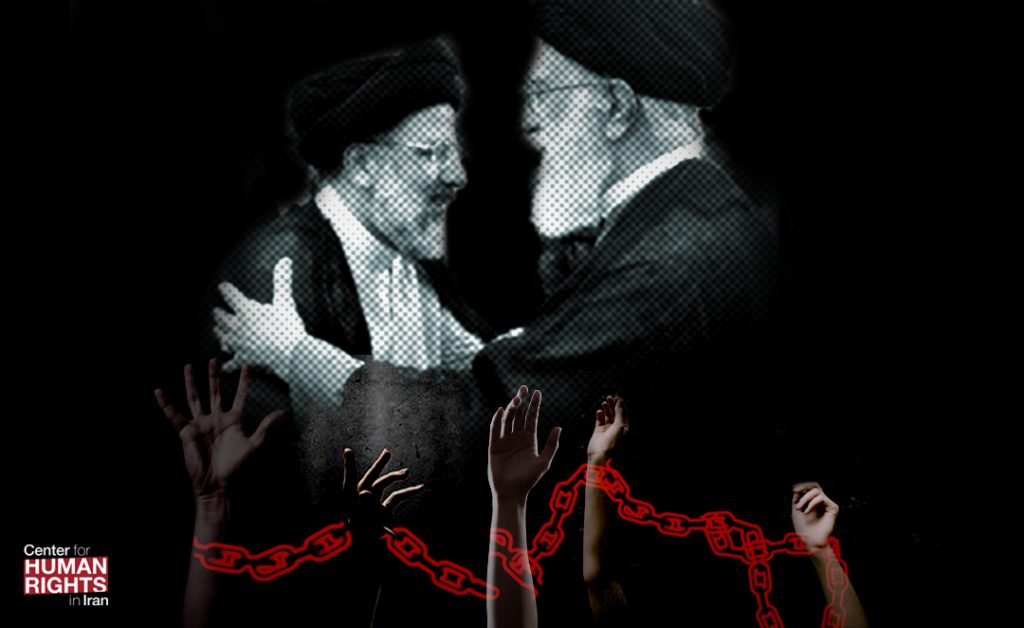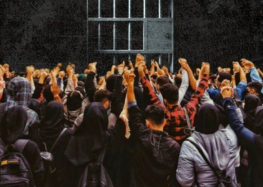Rule Allowing Appeals Hearings without Defendants Present is Blatant Violation of Law
 Judiciary Chief and Supreme Leader Hollow Out Appeal Process, Defendants’ Last Line of Defense
Judiciary Chief and Supreme Leader Hollow Out Appeal Process, Defendants’ Last Line of Defense
The decision by Iran’s Judiciary Chief Ebrahim Raisi, with Supreme Leader Ali Khamenei’s blessing, to prevent the presence of the defendant, plaintiff or their legal representatives at appeal hearings is a violation of the Constitution and Criminal Procedures Regulations, Iranian human rights activists said in interviews with the Center for Human Rights in Iran (CHRI).
“This action is against the Islamic Republic’s own laws,” said Shadi Sadr, an attorney and Executive Director of Justice for Iran, a human rights organization based in London. “It shows that if the Iranian judiciary does not like any part of current mandatory laws, it will easily circumvent them, without the approval of the legislature and the Guardian Council.”
She added: “The authorities say that the legislative process is too time consuming and therefore with the Supreme Leader’s approval they are self-legislating until the laws are changed sometime in the future. This downgrades Parliament to a mere ceremonial body. It’s a dangerous path that will perpetuate lawlessness in the country.”
After being appointed the head the judiciary in March 2019, Raisi changed the appeal process by informing courts they are no longer required to hold hearings before issuing their verdict.
Speaking to a group of judges on May 18, 2019, Raisi said the judicial and security establishment should carry on with the assumption that the appeal process does not exist.
“We believe that our colleagues in the police, security and court system should carry out their investigations and procedures as if there is no appeal process,” Raisi said. “The preliminary court should be so precise and persuasive in its decisions that the Appeals Court should actually be a Confirmation Court that only ensures that the will of God and rights of the people are attained.”
Two months later the change in the judicial process was confirmed by Judiciary Spokesman Gholam-Hossein Esmaili.
“As stated in a meeting with the honorable judiciary officials on July 20 [2019], his excellency the supreme leader has agreed with the respected judiciary chief’s request to temporary eliminate the process stipulated in Article 450 of the Criminal Procedures Regulations until the law is revised. Accordingly, the Appeals Court branches are no longer obliged to follow the necessary legal procedures,” Esmaili said on July 21, 2019.
In effect, Raisi is going above the law, according to Sadr. “What Raisi is saying is, ‘you don’t need to enforce the law. With the leader’s support, I will determine how you should function. Therefore, I’m the law,’” Sadr told CHRI.
Bypassing Parliament is contrary to the principle of separation of powers and a violation of the Constitution, which has delegated lawmaking to the legislative branch. It supplants the law with the whim of the Supreme Leader.
Article 450 of Iran’s Criminal Procedures Regulations states, “The Appeals Court should immediately set a time for a hearing and summon all sides whose presence is necessary for the case. All sides can be present in person or through their lawyer. The lawyer’s absence will not prevent the case from being adjudicated.”
Also Section 5 of Article 14 of the International Covenant on Civil and Political Rights states, “Everyone convicted of a crime shall have the right to his conviction and sentence being reviewed by a higher tribunal according to law.”
Attorney and human rights activist Mahnaz Parakand told CHRI, “It is very clear that these unlawful actions are purely intended to expand the leader’s authority without any legal authority in order to justify the Islamic Republic’s policies of greater intimidation and oppression of the Iranian people.”
“We are witnessing the gradual unlawful transfer of powers from legislative, executive and judicial institutions to the Supreme Leader,” the lawyer added.
The elimination of appeal hearings in the presence of all sides of the case and their lawyers has had a particularly adverse impact on activists, dissidents and others accused of national security crimes, robbing them of the right and opportunity to present a rebuttal against false accusations brought by the Islamic Revolutionary Guard Corps (IRGC) Intelligence Organization and the Intelligence Ministry.
For example, on May 18, 2019, four days before Raisi’s directive, student activist Leila Hosseinzadeh’s defense team succeeded in reducing her six-year prison sentence to 30 months after presenting a defense in front of the appellate court judge. She had been charged with “propaganda against the state” and “assembly and collusion against national security.”
Yet on July 2, a month and a half after Raisi hollowed out the appeal process, two other student activists, Parisa Rafiei and Pedram Pazireh, lost their appeal, and their sentence of seven years in prison and 74 lashes for the same charges was upheld.
“Obviously Raisi’s decision will harm political suspects and prisoners of conscience the most,” Parakand said. “These people are often facing charges cooked up by the security agencies.”
“The appeals courts have never had sufficient independence and have often upheld heavy sentences without fully observing the judicial process… but now Raisi’s decisions will give these judges, who are hand-picked and intimidated by the security agencies, the ability to issue outrageous verdicts with greater ease,” she added.
The change has come under criticism from some politicians, including the deputy chairman of the parliamentary committee for judicial and legal affairs, Mohammad Kazemi.
“In security, political and media cases, if people are convicted in the preliminary court, it is absolutely necessary to hold an appeal hearing and invite all sides involved,” Kazemi said on September 1, 2019.
He continued: “We must accept that in these serious cases when people are sentenced to four or five years in prison, it is necessary for the Appeals Court to summon the accused and review the verdict.”
Lawyer and human right activist Shadi Sadr emphasized the importance of the appeal process in the implementation of justice.
“The appeal process is one of the fundamental pillars of a fair judicial process which denies any single judge the ability to punish people without a second opinion from a higher authority. But the new situation created by the judiciary chief… has significantly limited suspects’ right to defend themselves,” she said.
Read this article in Persian.






